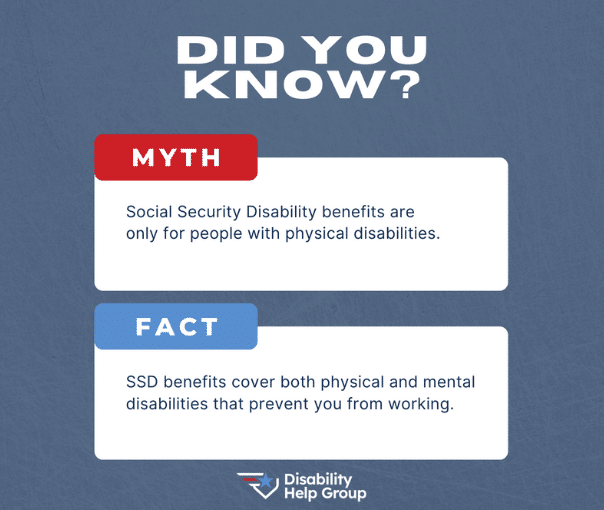Can’t Work Due to Anxiety and Depression
Many people experience symptoms of anxiety and depression. Anxiety is a feeling of worry, nervousness, or unease. Depression is a mood disorder that causes a persistent feeling of sadness and loss of interest.
You may qualify for SSDI disability benefits for depression or anxiety disorders. However, you must show that your symptoms interfere with your ability to work. You must also show that you can’t work due to anxiety and depression.
Depressive Disorders
Depression is a very common medical condition listed on Social Security disability applications.
Depressive disorders can cause:
- Fatigue,
- Decreased energy levels,
- Decreased motivation and loss of interest.
Depression and Social Security’s Listings of Medical Impairments
Social Security has a listing of impairments, known as the “Blue Book.” Under the Blue Book, you may qualify for disability benefits if you meet specific conditions. Social Security evaluates depressive disorders under listing 12.04. Additionally, the listings include a list of symptoms. It also includes a list of functional problems. You must show that your symptoms meet these conditions to qualify for disability benefits for depression. First, you must show at least five symptoms of depression to prove that you can’t work due to anxiety and depression.
Symptoms of depression can include:
- Depressed mood, loss of interest, appetite, or sleep disturbances
- Observable psychomotor agitation or retardation or decreased energy
- Feelings of guilt or worthlessness
- Difficulty concentrating or thinking
- Thoughts of death or suicide
Second, in addition to having at least three of the above symptoms, you must also prove that your symptoms cause a significant problem in your functioning. Generally, you must have an extreme limitation in at least one area or a marked limitation in at least two areas. These areas of functioning include:
Depression: Four areas of functioning
You must also prove that your symptoms cause a severe problem in your functioning. Generally, you must have an extreme limitation in at least one area. Alternatively, you can have a marked limitation in at least two areas.
These areas of functioning include:
- Understanding, remembering, or applying information (understanding instructions, learning new tasks, applying new knowledge to tasks, and using judgment in decisions)
- Interacting with others (the ability to use socially appropriate behaviors)
- Concentrating, persisting, or maintaining pace in performing tasks (staying focused and completing tasks)
- Adapting or managing oneself (the ability to perform daily activities such as paying bills, cooking, shopping, dressing, and keeping good hygiene)
Depression and the “C” criteria
Alternatively, you may also meet the listing another way.
Under the 12.04C, you can show your depressive disorder has been:
- Serious and ongoing for at least two years, and
- You need a very structured environment, such as an intensive outpatient or partial hospitalization program, or
- You cannot handle changes in your routine or environment
Anxiety Disorders
Anxiety disorders have many symptoms. They include overwhelming feelings of panic and fear. Additionally, symptoms include constant worry, irritability, insomnia, tiredness, difficulty focusing and constantly looking for threats. Anxiety symptoms can also cause physical symptoms. As a result, your anxiety may cause rapid heart rate, sweating, shaking, nausea, muscle tension, or difficulty breathing.
Anxiety and Social Security’s listings Of Medical Impairments
Social Security looks at anxiety disorders under listing 12.06. In order to qualify for disability benefits, you must have medical documentation that shows three or more anxiety symptoms.
Symptoms of Anxiety can be:
- Restlessness, easily fatigued, or difficulty concentrating
- Irritability, muscle tension, or problems sleeping
Anxiety: Four Areas Of Functioning
Additionally, you must also prove that your symptoms cause a severe problem in your functioning. They are the same areas of functioning that are evaluated for depression and include:
- Understanding, remembering, or applying information (understanding instructions, learning new tasks, applying new knowledge to tasks, and using judgment in decisions)
- Interacting with others (the ability to use socially appropriate behaviors)
- Concentrating, persisting, or maintaining pace in performing tasks (staying focused and completing tasks)
- Adapting or managing oneself (the ability to perform daily activities such as paying bills, cooking, shopping, dressing, and keeping good hygiene)
Anxiety and The “C” Criteria
On the other hand, you may also meet the criteria under the listing if your anxiety disorder has been:
- Required to keep a highly structured setting to reduce your symptoms, such as an intensive outpatient or partial hospitalization program, or
- Have minimal capacity to adapt to demands that are not already part of your daily life or changes to your environment

What if My Anxiety or Depression Does Not Meet a Listing?
Your depression or anxiety symptoms may not meet an SSD listing. Fortunately, you may still qualify for Social Security disability benefits. In this case, Social Security will consider your residual functional capacity (RFC). Your RFC is what you can do even with your medical impairments. Particularly, Social Security looks at how your depression or anxiety symptoms impact your ability to work.
Specifically, they consider your ability to:
- Carry out simple instructions
- Make simple work-related decisions
- Respond appropriately to supervision and co-workers and
- Handle changes in a routine
- Show up to work consistently, arrive on time, or leave early
What You Need For Your SSD Claim If You Can’t Work Due To Depression and Anxiety
It can be difficult to win disability benefits for depression or anxiety alone. However, the right documentation can support your claim. Therefore, you must see your doctor regularly. Tell them about all of the symptoms you have on a daily basis. Also, your disability advocate can explain the evidence you will need to prove you can’t work due to anxiety and depression.
Getting the Right Treatment for Depression and Anxiety
Social Security also looks at what kind of doctor is treating your anxiety and depression. As a rule, it is best to receive treatment from a mental health professional. Typically, these include a psychiatrist or psychologist. You may need to see a specialist to help prove that you can’t work due to anxiety and depression.
RFC Forms If You Can’t Work Due to Anxiety and Depression
If you can’t Work Due to Anxiety and Depression your doctor may also complete a residual functional capacity (RFC) form. An RFC form helps explain how your symptoms are impacting your functioning. Even if you think your medical evidence is strong, an RFC can help clearly explain how severe your symptoms are. Furthermore, it also helps to have your doctor’s opinion in the record. Your disability advocate can provide you with these forms.
Depression, Anxiety, and Physical Impairments
Social Security follows specific rules when making a decision. They look at your age, education, and work background. These medical-vocational guidelines are even more favorable when you have a physical condition in addition to depression or anxiety. These are also known as the Grid Rules. The rules make it easier to get your disability benefits the older you are.
Example 1: Applying the Grid Rules If You Can’t Work Due to Anxiety and Depression
51 years old and worked as a cashier. You have filed for disability due to osteoarthritis of your knees and anxiety. Your osteoarthritis prevents you from standing for long periods. Your anxiety symptoms make it hard for you to concentrate and be around crowds of people. If Social Security found that you could do a seated job that only required simple, routine tasks, you would qualify for benefits under the grid rules.
Example 2: Applying the Grid Rules if You Can’t Work Due to Anxiety and Depression
58 years old and worked previously as a medical receptionist for many years. You have filed for disability due to bulging discs in your back, depression, and anxiety. Your bulging discs would prevent you from performing physically demanding work and your depression and anxiety symptoms prevent you from doing the complex tasks of your previous job. In this case, the grid rules would allow Social Security to award you disability benefits even if you could do other work.
If you can’t Work Due to Anxiety and Depression or any other disability call Disability Help Group now to start your claim or appeal your denial. Feel free to call us at (800) 800-3332 or contact us here for a free consultation.
Related Articles to Can’t Work Due to Anxiety and Depression
- Is Osteoporosis a Disability?
- What is the Difference Between SSI and SSDI?
- I Just Received a Function Report Questionnaire from Social Security. What Should I Do?
- Why Your SSD Claim Might Be Denied?
- What is the SSDI Payment Schedule?
- How can I Check on My Disability Claim?
- Why Should I Hire a Disability Lawyer?
- What are the Over 50 Grid Rules?
- VA Benefits Appeal
- VA Disability Remand
- What are Social Security Disability Interview Questions?







